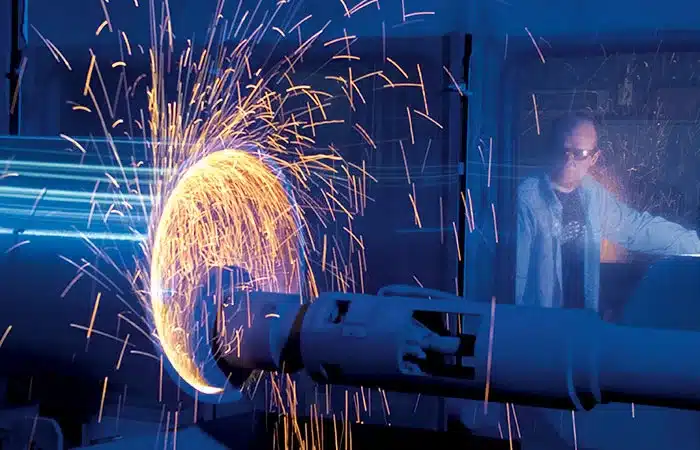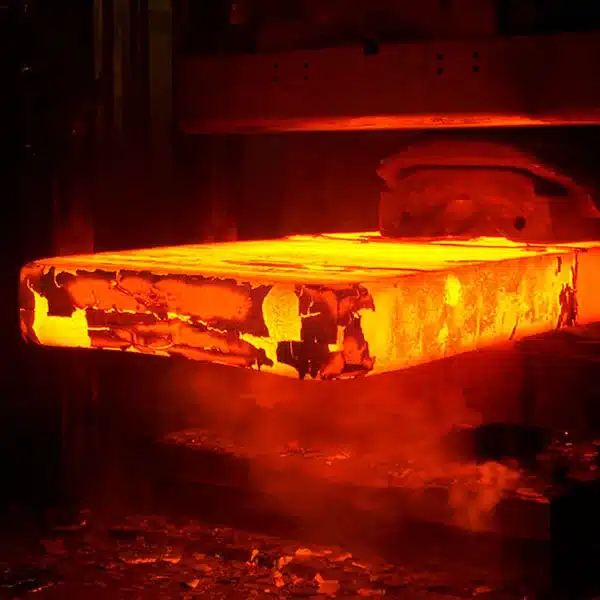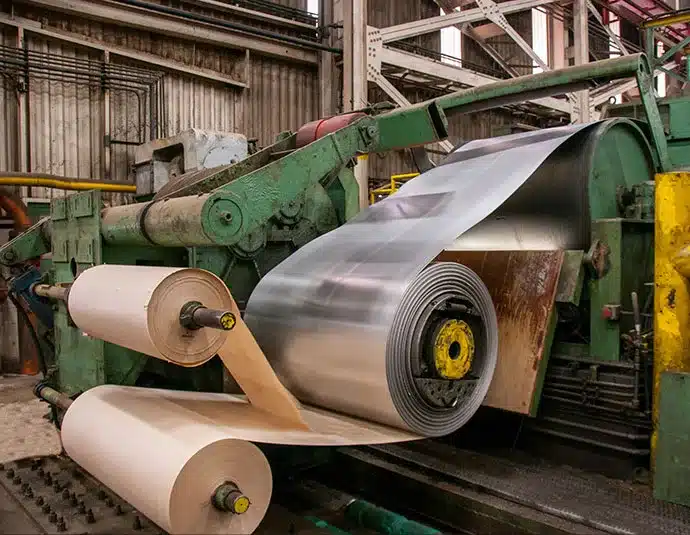What are titanium metal plates, and why are they important? These plates combine lightweight and high strength, making them crucial for aerospace, healthcare, and other fields. Discover their properties, grades, and uses.
Key Takeaways
- Titanium plates excel in strength-to-weight ratio, corrosion resistance, and biocompatibility, making them vital across aerospace, medical, and marine industries.
- Manufacturing techniques such as cold rolling, hot rolling, and advanced cutting methods ensure precise customization and high-quality standards of titanium plates.
- Choosing the right titanium plate involves evaluating factors such as grade, thickness, and intended application, while consulting with experts and requesting samples aids in informed decision-making.
Understanding Titanium Metal Plate
Titanium metal plates and titanium sheet are celebrated for their unmatched combination of strength, lightweight characteristics, and exceptional durability. Lighter than steel yet equally strong, titanium plates are invaluable across various applications, from aerospace to medical fields.
These plates are produced using both pure titanium and titanium alloys, ensuring a range of thicknesses and sizes to meet specific project needs. The meticulous manufacturing processes employed ensure that each titanium plate meets the highest standards of quality and precision, making them a reliable choice for industries that demand the best.
Properties of Titanium Metal Plate
Titanium’s low density and high strength are among its most lauded properties, offering significant advantages in applications where weight and durability are critical. Its excellent corrosion resistance, particularly against elements like water and chlorine, makes it an ideal material for marine and chemical processing industries.
Additionally, titanium’s impressive strength-to-weight ratio allows for the construction of robust yet lightweight structures, a key benefit in aerospace and automotive applications. The corrosion resistance of Grade 1 titanium, for instance, is particularly notable, making it suitable for environments with oxidizing, neutral, and mildly reducing media.
Common Grades of Titanium Plate
Titanium alloys are categorized into various grades, each defined by specific UNS codes and tailored to different applications. For example, Grade 1 titanium plates are the softest and most ductile, making them ideal for applications that require deep drawing and excellent corrosion resistance. These properties make Grade 1 a popular choice in medical, chemical equipment, and aerospace industries.
Grade 2 titanium, known as the “workhorse” of commercially pure titanium, combines high strength, ductility, and excellent corrosion resistance. This grade is extensively used in applications that require a balance of formability and strength, such as chemical processing and marine environments. The versatility of Grade 2 makes it a staple in various industrial applications.
For more demanding applications, Grade 5 titanium plates, also known as Ti-6Al-4V, offer high strength, excellent corrosion resistance, and heat resistance. This grade is commonly used in aerospace, military, and power generation industries, where materials must withstand extreme conditions. Daxun Alloy specializes in producing high-performance titanium alloy plates, ensuring that each grade meets the rigorous standards required by these industries.
Typical Applications
Titanium plates are utilized across a broad spectrum of industries due to their exceptional properties. In the aerospace sector, titanium’s strength-to-weight ratio makes it indispensable for constructing airplane structures and frames. The medical field leverages titanium’s biocompatibility and durability for surgical hardware and implants.
Additionally, titanium’s excellent corrosion resistance makes it an ideal material for marine environments and chemical processing applications. With such versatile applications, it’s no wonder that titanium continues to be a material of choice for critical and demanding projects.
Manufacturing Techniques for Titanium Plates
The production of titanium plates involves a variety of sophisticated techniques to achieve the desired dimensions and properties. Rolling methods, such as cold rolling and hot rolling, play a significant role in shaping the plates to meet specific thickness requirements. Additionally, advanced cutting methods, including CNC milling and laser cutting, allow for precise customization.
High precision and quality in the manufacturing process are crucial as they directly impact the performance and reliability of titanium plates in their respective applications.
Cold Rolling and Hot Rolling
Cold rolling and hot rolling are essential techniques in the production of titanium plates. Cold rolling involves taking hot-rolled titanium strips and subjecting them to processes like atmospheric annealing and cold rolling to achieve the desired thickness. This method is particularly effective for creating thinner plates with a smooth finish.
On the other hand, hot rolling involves heating titanium slabs and rolling them to create thick plates, ensuring that the oxygen diffusion layer is managed to maintain quality. These techniques allow manufacturers like Daxun Alloy to produce titanium plates with thicknesses ranging from 0.5mm to 300mm.
Forging and Cutting Methods
Forging and cutting methods are critical in tailoring titanium plates to meet specific requirements. DAXUN employs various cutting techniques such as laser cutting, waterjet cutting, and plasma cutting to achieve precise shapes and sizes.
Waterjet cutting, for example, uses a high-pressure stream of water to cut through titanium, offering clean edges and flexibility for intricate shapes. These advanced methods ensure that the final products meet the exact specifications needed for diverse applications.
Quality Control Measures
Quality control is paramount in the manufacturing of titanium plates to guarantee their integrity and reliability. DAXUN conducts a variety of mechanical tests, including flattening tests, pitting and resistance tests, hardness tests, and material positive identification tests to ensure that each titanium plate meets the highest standards. Compliance with international standards such as ASTM, ASME, and ISO further ensures the quality and safety of the products.
By adhering to these stringent quality control measures, manufacturers can deliver titanium plates that perform reliably in their intended applications.
Advantages of Using Titanium Plates
Titanium plates offer a range of advantages that make them a material of choice for various industries. Their unique combination of strength and lightweight properties allows for the construction of robust yet light structures. Additionally, the durability and resistance to extreme temperatures make titanium plates suitable for demanding environments.
These benefits, along with their corrosion resistance and biocompatibility, position titanium plates as a versatile and reliable option for numerous applications.
Corrosion Resistance
One of the standout features of titanium plates is their exceptional corrosion resistance, which makes them ideal for use in harsh environments. For instance, the 6AL-4V titanium alloy is known for its high resistance to corrosion, making it suitable for marine and industrial applications. This resistance to corrosion allows titanium components to withstand aggressive elements like seawater, ensuring longevity and reliability in marine environments.
Unlike materials like aluminum, which can corrode over time, titanium maintains its integrity, reducing maintenance costs and extending the lifespan of the products.
Strength-to-Weight Ratio
Titanium’s remarkable strength-to-weight ratio is another significant advantage. It possesses the highest strength-to-weight ratio of any metal, making it ideal for applications where reducing weight is crucial without sacrificing strength. This unique property allows for the construction of lightweight yet durable structures, such as in aerospace and automotive industries.
For example, utilizing titanium plates in ship hulls can result in a lighter vessel while maintaining the same load capacity, offering both performance and efficiency benefits.
Biocompatibility
Titanium’s biocompatibility is a key reason for its widespread use in medical applications. This property allows titanium to integrate well with human tissues, making it a preferred material for medical implants and devices. Titanium implants, such as hip replacements and dental fixtures, can last over 20 years without significant issues, thanks to their ability to bond with bone and other tissues.
This biocompatibility minimizes the risk of rejection by the body, ensuring patient safety and enhancing medical outcomes.
Customization and Value-Added Services
Titanium plates can be tailored to meet specific customer requirements through a variety of customization options. This flexibility enhances the functionality and performance of titanium plates in diverse applications.
Daxun Alloy offers a range of value-added services, including:
- custom cutting
- bending
- edge preparation
- welding
This ensures that each titanium plate meets the unique needs of its customers.
These services not only improve the usability of the products but also provide solutions that are perfectly aligned with project specifications.
Custom Cutting Solutions
Custom cutting solutions are essential for achieving precise shapes and sizes while maintaining the material properties of titanium plates. Techniques such as laser cutting, waterjet cutting, and plasma cutting each offer unique benefits, such as precision and reduced thermal distortion. These advanced methods ensure high-quality, customized titanium plates suitable for various applications across industries.
Daxun Alloy specializes in providing these custom cutting solutions, tailoring services to meet specific customer needs.
Additional Processing Services
In addition to custom cutting, Daxun Alloy offers a range of additional processing services that enhance the utility of titanium plates for various applications. These services include bending, edge preparation, and welding, which add to the versatility and performance of the titanium products.
By providing these value-added services, Daxun Alloy ensures that its titanium plates meet the rigorous demands of different industries and applications.
Packaging and Shipping
Proper packaging and shipping are critical to ensuring that titanium products arrive at their destination in perfect condition. Customized packaging solutions protect titanium plates during transport and storage, preventing damage and maintaining their integrity. Special handling is often required when shipping titanium plates, particularly for international shipments, to safeguard against transit-related damages.
Daxun Alloy provides effective packaging solutions tailored to the needs of their customers, ensuring that the products are ready for immediate use upon arrival.
Industry-Specific Applications
Titanium plates are indispensable in various industries due to their unique properties. In the aerospace and military sectors, titanium’s strength-to-weight ratio and durability make it ideal for constructing lightweight and robust structures. The medical field relies on titanium’s biocompatibility and corrosion resistance for surgical implants and devices.
Additionally, the marine and chemical processing industries benefit from titanium’s exceptional resistance to corrosion, making it suitable for harsh environments. These industry-specific applications highlight the versatility and reliability of titanium plates across different sectors.
Aerospace and Military
Titanium’s remarkable strength-to-weight ratio makes it a preferred material in the aerospace and military industries. For instance, the Airbus A380 incorporates approximately 70 tons of titanium in its structure and fittings. The SR-71 Blackbird was the first aircraft to utilize titanium extensively to withstand high aerodynamic friction.
Grade 5 titanium alloy, also known as Ti-6Al-4V, is widely used in aerospace due to its strength and corrosion resistance. These properties ensure that titanium components can withstand the demanding conditions of flight and combat, making them essential for aerospace and military applications.
Medical and Healthcare
In the medical field, titanium plates play a crucial role due to their biocompatibility and durability. They are commonly used for implants to replace broken bones and joints, as well as in dental procedures such as tooth implants.
Grade 2 titanium plates, known for their corrosion resistance and biocompatibility, are ideal for a variety of medical applications. These plates ensure patient safety and enhance medical outcomes, making them indispensable in healthcare settings.
The adoption of titanium in medical applications underscores its importance in ensuring long-term success and reliability in medical treatments.
Marine and Chemical Processing
Titanium’s exceptional resistance to corrosion makes it highly suitable for marine and chemical processing applications. The natural oxide layer on titanium provides excellent protection against corrosion, enabling it to withstand aggressive environments. This high corrosion resistance ensures that titanium components maintain their integrity and performance even in harsh conditions.
For example, using titanium plates for ship hulls can result in lighter ships with the same load capacity, enhancing efficiency and performance in marine applications. In chemical processing, titanium’s ability to resist chemical attacks makes it an ideal material for various industrial environments.
Technical Specifications and Standards
Understanding the technical specifications and standards of titanium plates is essential for selecting the right material for any application. Metal standards ensure the quality and compliance of titanium plates across various industries.
When requesting quotes, it’s crucial to specify the required specifications, including dimensions and intended application, to ensure the titanium plate meets the project’s needs. Obtaining detailed quotes and physical samples allows buyers to assess the quality and specifications of titanium plates before making a commitment.
This helps in verifying that the chosen titanium plate meets all necessary requirements and ensures its suitability for the intended application.
Physical and Mechanical Properties
The physical and mechanical properties of titanium plates vary depending on the grade. For example, Grade 1 titanium sheets offer a minimum tensile strength of 240 MPa, a yield strength of 138 MPa, and an elongation of at least 24%.
Grade 2 titanium plates have a minimum tensile strength of 50,000 psi and a yield strength of 40,000 psi. The available thicknesses for Grade 2 titanium plates range from 0.5 mm to 120 mm, with a melting point of 1660°C.
These properties make titanium plates suitable for a wide range of applications, from medical to industrial uses.
Compliance with International Standards
Compliance with international standards is crucial for ensuring the quality and safety of titanium plates. Standards for titanium and titanium alloy products are developed in line with principles established by the World Trade Organization (WTO) Technical Barriers to Trade Committee. This alignment ensures that titanium products meet global quality and safety requirements, making them reliable for international use.
Additionally, compliance with regulations such as RoHS and REACH is important for minimizing hazardous substances in manufacturing. By adhering to these standards, manufacturers can provide high-quality titanium plates that meet the rigorous demands of various industries.
Certification and Testing
Certification and rigorous testing are essential components of quality assurance for titanium plates. Mill Test Certificates are commonly used to verify compliance with specified material standards. These certificates provide verifiable proof that the materials meet the required specifications during manufacturing.
Testing methods such as Ultrasonic Testing (UT), SGS testing, and TUV are crucial for ensuring the quality and reliability of titanium plates. By conducting these tests, manufacturers like Daxun Alloy ensure that their products meet the highest standards of quality and performance.
How to Choose the Right Titanium Plate
Selecting the right titanium plate involves considering several important factors, such as the grade, thickness, and intended use. Consulting with suppliers and industry experts can help ensure that you make informed decisions about the appropriate titanium plate for your specific needs.
Requesting quotes and samples is advisable to ensure that the titanium plate meets your requirements before making a purchase. By carefully evaluating these factors, you can select a titanium plate that is perfectly suited to your project’s needs.
Factors to Consider
Before:
When choosing titanium plates, it is crucial to consider factors such as the specific grade, thickness, and the environmental conditions in which the plate will operate. The intended application also plays a significant role in determining the appropriate titanium plate.
After incorporating the keyword:
After reviewing the various items available, we can conclude that the selection is quite diverse.
When choosing titanium plates, consider the following factors:
- Specific grade
- Thickness
- Environmental conditions in which the plate will operate
- Intended application
For instance, applications requiring high strength and corrosion resistance might benefit from Grade 5 titanium plates, while those needing excellent formability and weldability might opt for Grade 2. By taking these factors into account, you can select a titanium plate that meets all your project specifications.
Consulting with Experts
Engaging with suppliers and industry experts is essential for making informed decisions about titanium plates. Knowledgeable suppliers can offer valuable insights that can help clarify the selection process of titanium materials. These insights can greatly aid in making informed choices regarding the properties and applications of titanium plates.
Consulting with experts ensures that you select the best possible material for your needs, optimizing both performance and cost-efficiency.
Requesting Quotes and Samples
Requesting quotes and samples is a critical step in the process of selecting titanium plates. When requesting a quote, it is important to specify the grade, dimensions, and expected finish of the titanium plate to receive accurate pricing. Clear communication with suppliers about your specific needs is pivotal in obtaining quotes that truly reflect your requirements.
Requesting samples allows you to assess the quality and characteristics of the titanium plate before committing to a larger order, ensuring that the material meets your project’s specifications.
Summary
Titanium plates stand out as a versatile and durable material, essential across various industries due to their unique properties such as strength, corrosion resistance, and biocompatibility. From aerospace and military applications to medical and marine environments, titanium plates offer unmatched performance and reliability. Understanding the different grades and manufacturing techniques helps in selecting the right titanium plate for specific needs. With stringent quality control measures and adherence to international standards, manufacturers like Daxun Alloy ensure that each titanium plate meets the highest standards of quality and performance. As you consider your next project, remember that the right titanium plate can make all the difference, offering a blend of durability, lightweight properties, and exceptional performance.
Frequently Asked Questions
What are the main properties of titanium plates?
Titanium plates possess a high strength-to-weight ratio, outstanding corrosion resistance, and biocompatibility. These properties make them ideal for a variety of applications in challenging environments.
What are the common grades of titanium plates and their uses?
Common grades of titanium plates include Grade 1, which is soft and ductile for deep drawing; Grade 2, known for its high strength and corrosion resistance, used in chemical processing; and Grade 5, which offers high strength and heat resistance for aerospace and military applications. These grades serve specific industrial needs based on their unique properties.
How are titanium plates manufactured?
Titanium plates are manufactured through processes including cold rolling, hot rolling, forging, and advanced cutting techniques such as laser and waterjet cutting. These methods ensure precision and strength in the final product.
Why is titanium preferred in the medical field?
Titanium is preferred in the medical field due to its exceptional biocompatibility, enabling effective integration with human tissues. This property makes it an excellent choice for medical implants and devices.
What quality control measures are in place for titanium plates?
Quality control measures for titanium plates include tests for flattening, pitting resistance, hardness, and material identification, ensuring compliance with international standards. This rigorous testing process guarantees the integrity and reliability of the product.






